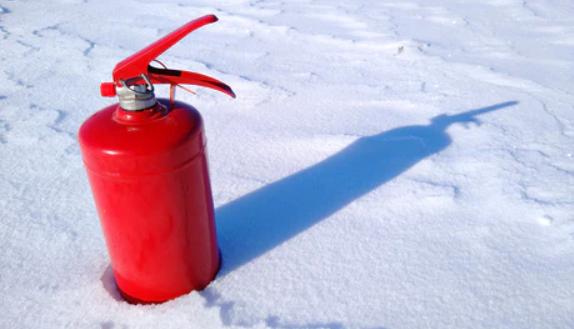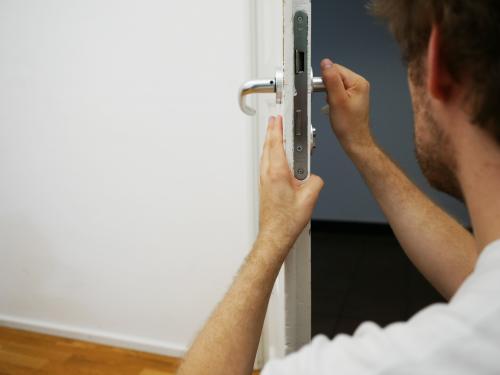Fire Extinguishers: Cold Weather Concerns

What to do in case of fire? Is your home or office truly secure? Well! Having essential safety equipment like fire extinguishers can make a significant difference. Understanding how to use these tools and where to place them is crucial for safeguarding your loved ones and property.
Let’s discuss a complete guideline about fire extinguishers in detail.
What Is A Fire Extinguisher?
It is a common type of fire protection tool that protects you and your loved ones from fires. It helps you to extinguish and control small flames both in residential and commercial spaces.
Moreover, it's a cylinder-shaped device that is filled with chemicals to put down the spread of fire. There are specific wall-mounted brackets designed to hold fire extinguishers for quick access in the event of fire.
Why Do I Need A Fire Extinguisher?
Here are the reasons to buy a fire extinguisher for your home:
These safety rules provide a quick response to small fires or sparks.
Fire safety extinguishers are essential kitchen safety components during cooking.
By having this type of safety tool, you can protect your valuable items like vital documents like passports, birth certificates, and property legal documents.
Additionally, there is no compromise on family protection. So let’s buy a fire extinguisher and save your loved ones that are truly meant for you.
Installing a fire extinguisher means you have a safety tool to protect yourself and your home. Therefore, it also gives you complete peace of mind.
Can Fire Extinguishers Freeze In The Cold?
Fire extinguishers have different chemicals with different freezing points so, it makes sense that water-based extinguishers including foam and wet chemical types become susceptible to freezing. This can render them ineffective in case of fire.
In contrast, dry chemicals, carbon dioxide, and certain dry powder extinguishers are generally less affected by cold weather. Now the question arises why do ABC fire extinguishers work in freezing temperatures?
These types of extinguishers work regularly down to -20 degrees centigrade. Therefore, it is very unlikely that an extinguisher of this type will freeze unless exceptionally cold weather occurs.
So, prioritize fire safety with regular inspections and maintenance.
Whether you have a fire extinguisher system or a fire sprinkler system in your building, ensure easy accessibility and optimal performance through routine checks. To safeguard your equipment consider these key pointers:
Protect fire extinguishers from freezing with cabinets or covers.
Invest in low-freeze extinguishers for extreme cold environments.
Prioritize indoor storage for optimal performance.
Consult manufacturer guidelines for specific recommendations.
Can Fire Extinguishers Be Stored Outside?
You can store fire extinguishers outside only if they are safe. Place the extinguisher in a secure and waterproof place to protect it from the elements.
This is life-safety equipment designed to protect you from small fires. Furthermore, never leave them in areas with high fire risks like sheds or garages. Before storing, you must ensure that these locations are secured, hidden, and locked away to prevent accidents.
Which Type Of Fire Extinguishers Can Be Used In Cool Weather?
Can fire extinguishers be used in freezing conditions? Well! Freezing temperatures can stop the effectiveness of a few fire extinguishers. Water, water mist, film-forming, and Class K extinguishers do not work in freeing and become useless.
Moreover, carbon dioxide, halogenated agents, dry chemicals, and dry powder extinguishers generally perform well in cool weather. To get optimal results, consider storing them indoors, consulting a fire protection expert, and opting for a fire extinguisher service is important, especially in cold weather.
Types of Fire Extinguishers and Their Uses
Understanding the different types of fire extinguishers is crucial for effective fire safety. Here's a breakdown:
Water: Suitable for Class A fires (ordinary combustibles like wood, paper, and textiles).
Foam: Effective for Class A and B fires (liquids like gasoline and oil).
Dry Chemical: Versatile for Class A, B, and C fires (electrical equipment).
Carbon Dioxide: Primarily used for Class B and C fires.
Wet Chemical: Specifically designed for Class F fires (cooking oils and fats).
Is It Safe To Keep Fire Extinguishers In Cold Weather?
No, it is generally not safe to keep a fire extinguisher in cold weather. Cold weather can affect certain types of fire extinguishers. During mild and freezing conditions, they become susceptible to moisture and precipitation which leads to rusting and corrosion. As a result, the extinguisher cylinder loses pressure and fails.
Additionally, A fire extinguisher with dents, corrosion, and a broken handle might be unable to release the content inside it. Therefore, check the pressure gauge regularly. Replace the cylinder if the extinguisher needle is not in the green zone.
Furthermore, carefully examine rust or a clogged nozzle on the canister. For safety concerns, replace a damaged or used extinguisher whether it is empty or not.
Get Ultimate Fire Safety At Your Home With Professionals
If you are looking for a fire safety company, then save time by picking N8 Fire and Safety firm. A leading provider that has served their fire safety services with over 25 years of experience.
Their services include fire extinguisher inspection and maintenance, kitchen fire system installation, emergency exit light installation, and many more.
Moreover, their professionals are trained, and certified to handle all your safety needs effectively and efficiently. Contact them to elevate your home or workplace safety standards without breaking the bank!






Comments